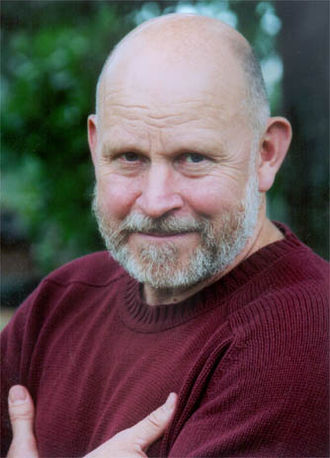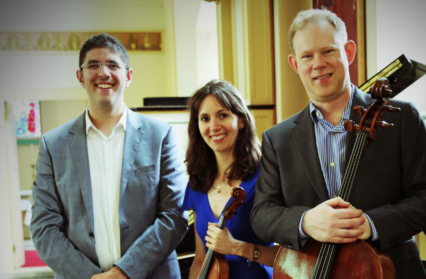Cath Barton casts a critical eye over a performance by the Odysseus Trio at the Vale of Glamorgan Festival and discusses the performed pieces of music.
Introducing this lunchtime concert in celebration of the Vale of Glamorgan Festival’s 50thanniversary year, and coinciding with the announcement of its 2019 programme, Artistic Director John Metcalf reminded us that the festival focuses on music by living composers so as to give “a sense of where music is going, rather than where it has been.”
Although playing together here as the Odysseus Trio, the three musicians taking part in this concert all have wide-ranging careers as both soloists and chamber musicians in Wales and internationally, and have had close associations with the Vale of Glamorgan Festival previously.

The composers featured in this concert have also all featured in the Festival’s programmes before. In 2016 VoG celebrated the 70thbirthday of Latvian composer Peteris Vasks, including the world premiere of his viola concerto. His contribution to this concert was the more modest but very alluring White Scenery (Winter) from his cycle of Seasons pieces for solo piano. Robin Green played this meditative opener with great delicacy, creating a vivid picture of an icy winter landscape in a few minutes of music.
Co-founder of the legendary New York Collective ‘Bang on a Can’ David Lang wrote his piece for cello, World to Come, after 9/11, and it had its UK premiere at the VoG Festival in 2004. In this programme his undanceable for piano and cello – played with verve by Alice Neary on plucked strings – demonstrated a more playful side to his music.
Estonia and its composers are no strangers to the VoG Festival. Mihkel Kerem’s charming lullaby for cello and piano, Asleep, written for his young daughter, was here given its world premiere. Behind the lyricism of the cello part, the piano stutters, as if afraid of of disturbing the child.

Robin Green introduced a selection from György Kurtág’s Játékok (Games),composed for himself and his wife to play, and for use in teaching. He told us that, in contrast to his trademark miniatures, Kurtág, now aged 92, has been working for the past 15 years on a 2-hour opera based on Samuel Beckett’s Endgame, premiering at La Scala, Milan this month. That information somehow serves to further highlight the intensity of these tiny sparkling piano pieces. Particularly striking among those played were Perpetuum Mobile, a brief waterfall of sound, and Voice from Far Away, in which the pianist sings softly as he plays.
The finale of the 2015 VoG Festival showcased works by the two featured composers that year, Arvo Pärt and Dobrinka Tabakova, whose shimmering choral work Centuries of Meditation was particularly memorable. Here her work was represented by a short piece for violin and piano, Rhodopa, using folk melodiestoconvey a sound picture of the mountains of that name in her home country of Bulgaria.
The most substantial piece in the concert was Welsh composer Huw Watkins’s robust Piano Trio, commissioned by Vernon Ellis for the Florestan Trio in 2009. A pianist himself who has a particular love of strings and piano chamber music, Watkins is another composer who is part of the Vale of Glamorgan Festival family so very well showcased in this concert.
The Vale of Glamorgan Festival 2019 takes place from 18thto 24thMay, and features 10 commissions for Astrid the Dutch Street Organ, 8 of them from Welsh composers. Full details of all the concerts in the festival week can be found here.
Cath Barton is an English writer who lives in Wales. Her prize-winning debut novella The Plankton Collector is published by New Welsh Review under their Rarebyte imprint. Cath is on the 2018 Literature Wales Mentoring programme, working on a collection of short stories inspired by the work of Hieronymus Bosch.
@CathBarton1



 Enjoyed this article? Support our writers directly by buying them a coffee and clicking this link.
Enjoyed this article? Support our writers directly by buying them a coffee and clicking this link.







